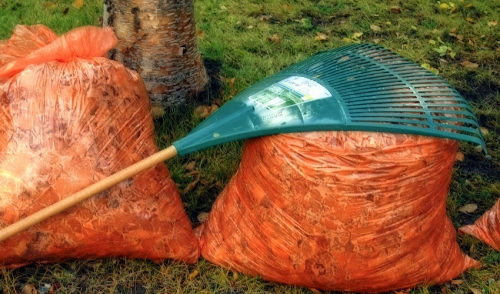{article.name}
Why do We Rake Leaves?
Raking leaves serves multiple purposes

- Share this:
- Share on Facebook
- Pin on Pinterest
- Tweet on Twitter
Summer is coming to a close and it is almost that time of the year again. Raking leaves is very important primarily for the look and healthiness of your lawn. Raking leaves serves multiple purposes. Raking leaves goes farther than exercising on a beautiful autumn day or creating piles for your kids to play in. No doubt, these are great benefits to raking leaves, but why do we really rake leaves? The answer is to develop a green, healthy lawn in the spring. Raking fallen leaves in the fall is a must in order for this to take place. A good point to remember is that you do not have to bag all the leaves and set them on curb to be collected. You can reuse your old leaves for compost, or mulching for nourishment of future gardening projects.
To create a vibrant and green lawn without bare patches in the spring, all it takes is raking your leaves in the fall. To understand how this works, we dive into a little biology. Many are unaware, but during the fall, grass turf is still photosynthesizing even before the snow falls to create and store energy. When your leaves are left to cover your lawn, the blades of the grass are unable to absorb sunlight properly in order to complete this process of photosynthesis. In some cases when the leaves are dry and the sun shines, this process of photosynthesis is still able to occur up to a certain extent; however, when the leaves become piles and wet, they form thick mats that completely block light and cover the blades of grass. Even when your grass may appear brown and dead during the winter months, the grass still needs air circulation, water, and nutrients in order to produce a healthy lawn for the spring. If the lawn is smothered in piles of leaves, the blades of grass are unable to obtain these vital resources. Raking your lawn is also helpful for removing any thatch that may have built up on your lawn. Thatch not only prevents nutrients and water from reaching the roots of your lawn, it also keeps new blades from sprouting.
Another reason we rake is to reduce garden pests. Piles of decomposing leaves have the ability to form an ideal environment for garden pests to eat and destroy your lawn. Raking your leaves will prevent this from happening. Finally, you should rake leaves to compost and to use for mulching. Raked up leaves are essential ingredients for the decomposing environment. Shred the leaves before adding them to the compost bin as a whole. By spring you will reap the rewards of your compost when you have a rich organic mixture that you can use for your garden. You can also use your raked up, shredded leaves as mulch in your yard. This type of mulch can provide your lawn with organic nutrients and add winter protection to your perennial beds.



Comments